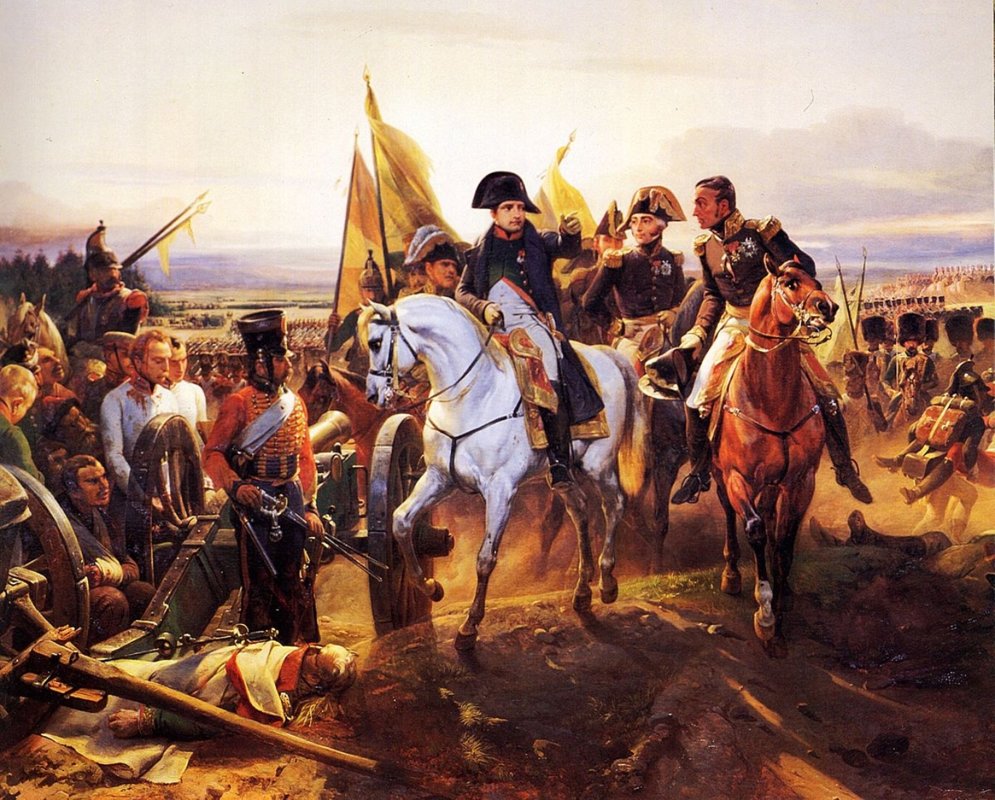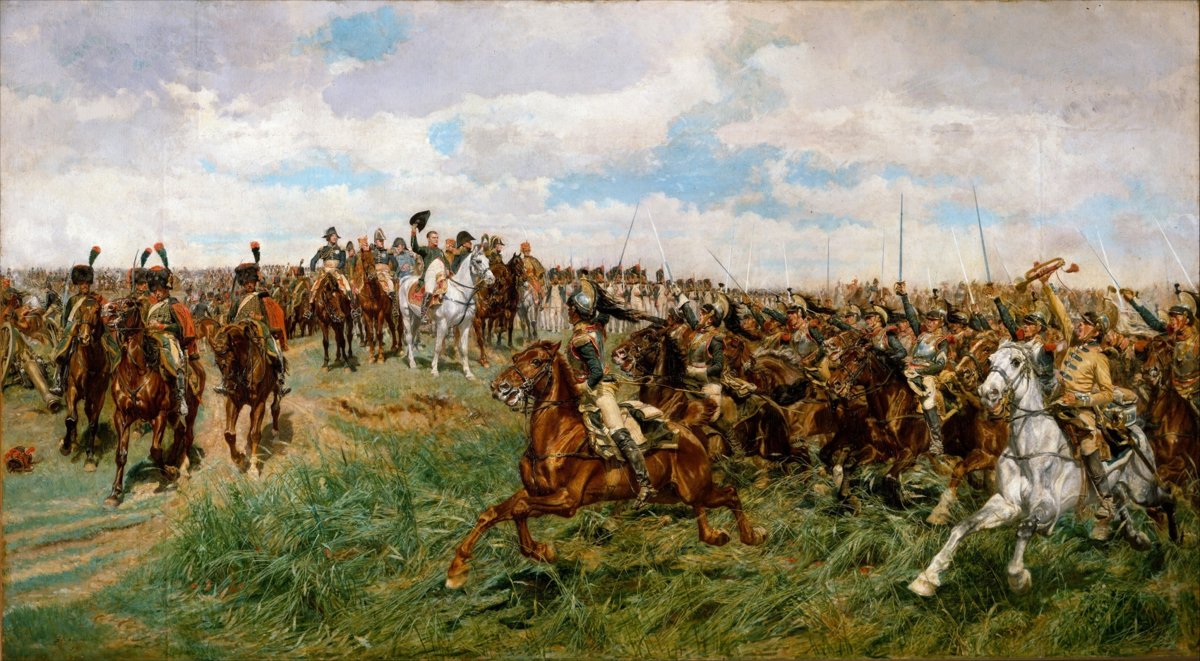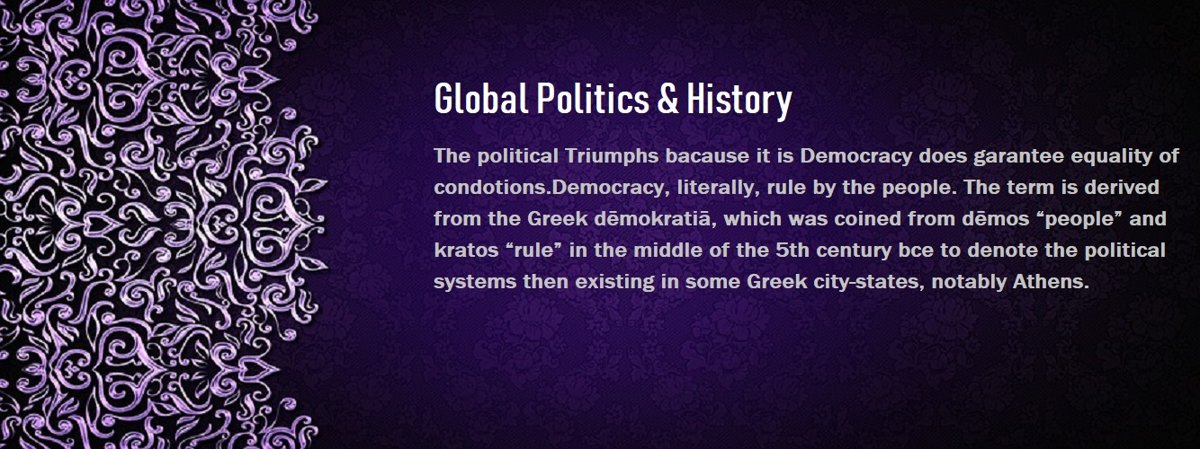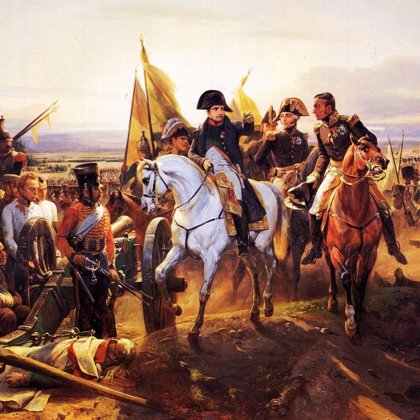THE BATTLE OF FRIEDLAND (JUNE,14, 1807) WAS A MAJOR CONFRONTATION OF THE NAPOLEONIC WARS BETWEEN THE ARMIES OF FRENCH EMPIRE COMMANDED BY NAPOLEON I,AND THE RUSSIAN EMPIRE LED BY GENERAL LEVIN AUGUST VON BENNIGSEN.NAPOLEON WAS VIRTUALLY IN CONTROL OF WESTERN AND CENTRAL EUROPE.
 The Battle of Friedland (June 14, 1807) was a major confrontation of the Napoleonic Wars between the armies of the French Empire commanded by Napoleon I and the armies of the Russian Empire led by Count von Bennigsen. Napoleon and the French obtained a decisive victory that routed much of the Russian army, which retreated chaotically over the Alle River by the end of the fighting. The battlefield is located in modern-day Kaliningrad Oblast, near the town of Pravdinsk, Russia.
The Battle of Friedland (June 14, 1807) was a major confrontation of the Napoleonic Wars between the armies of the French Empire commanded by Napoleon I and the armies of the Russian Empire led by Count von Bennigsen. Napoleon and the French obtained a decisive victory that routed much of the Russian army, which retreated chaotically over the Alle River by the end of the fighting. The battlefield is located in modern-day Kaliningrad Oblast, near the town of Pravdinsk, Russia.
Friedland was a satisfying culmination for Napoleon to an otherwise miserable campaign. Since his brilliant double victory over the Prussian army at Jena and Auerstadt the year before, he had not been able to knock Prussia out of the war. And the exasperating Russians just wouldn't quit. Battle after battle had been some of the bloodiest Napoleon had ever fought, and yet each ended in a draw. Then at last came Friedland. As with my other articles, while Friedland may not be obscure to Napoleonophiles, it has always been dear to my heart as battles go, and I wanted to do a map and commentary on it. So if you are still one of those who complain.It seemed like Napoleon was losing his edge. The years 1805 and 1806 had seen two of his greatest strategic victories, Austerlitz and Jena-Auerstadt, in which he apparently had knocked out two formidable adversaries, Austria and Prussia. But since the latter battle, things hadn’t gone so well. Though three-quarters of its army was wiped out, Prussia was not completely subdued. It had fought on, moving its capital to the fortress port of Königsberg in East Prussia (now the Kaliningrad enclave of the Russian Federation). And the Russians had yet to come to terms, even though they had been one of the losers at Austerlitz. Napoleon had won the battles but hadn’t yet won the war—at least the latest War of the Fourth Coalition. So he and his army couldn’t go home to their adoring families. Though the Emperor did have his new 20 year-old Polish mistress, Marie Walewska, to massage his throbbing temples.All during the winter and spring of 1806-07, Napoleon’s troops fought one bloody, indecisive battle after another with the Russians. From Pultusk to Golymin to Hof to Eylau to Heilsberg, the French won tactical victory after victory inasmuch as the Russians would always withdraw from the battlefield in the night--but at such great cost and without the Russian commander, Bennigsen, surrendering. The Russians just didn't know when they were beaten.Consequently, that winter would greatly sap the strength and morale of the Grande Armée. Though it had fought ferociously for two continuous years, it was not allowed to go home yet. Suicides among the French troops were soaring. Napoleon estimated that 40% of his soldiers had deserted during the winter. The now-familiar term "grognards," which Napoleon had coined to describe his grumbling Guard infantry, who openly cursed him as he passed, started with this winter in Poland. He was a dictator, but not a vindictive one, and tolerated verbal abuse from his rank and file without punishing any of them. He seemed to recognize that they needed some outlet to their frustration.Meanwhile, on the Baltic, the siege of Danzig dragged on, with 14,400 Prussians under Kalckreuth tying down nearly twice that number of French for months. Napoleon couldn't let this important port on the Baltic stay in Prussian hands. It was vital to secure his logistics. But the Prussians didn't know they were beaten either.On June 19, Emperor Alexander sent an envoy to seek an armistice with the French. Napoleon assured the envoy that the Vistula River represented the natural borders between French and Russian influence in Europe. On that basis, the two emperors began peace negotiations at the town of Tilsit after meeting on an iconic raft on the River Niemen. The very first thing Alexander said to Napoleon was probably well-calibrated: "I hate the English as much as you do."Napoleon reportedly replied, "Then we have already made peace." The two emperors spent several days reviewing each other's armies, passing out medals, and frequently talking about non-political subjects.Although the negotiations at Tilsit featured plenty of pageantry and diplomatic niceties, they were not spared from ruthless politics. Alexander faced pressure from his brother, Duke Constantine, to make peace with Napoleon. Given the victory he had just achieved, the French emperor offered the Russians relatively lenient terms–demanding that Russia join the Continental System, withdraw its forces from Wallachia and Moldavia, and hand over the Ionian Islands to France.[31] By contrast, Napoleon dictated very harsh peace terms for Prussia, despite the ceaseless exhortations of Queen Louise. Wiping out half of Prussian territories from the map, Napoleon created a new kingdom of 1,100 square miles called Westphalia. He then appointed his young brother Jérôme as the new monarch of this kingdom. Prussia's humiliating treatment at Tilsit caused a deep and bitter antagonism which festered as the Napoleonic Era progressed. Moreover, Alexander's pretensions at friendship with Napoleon led the latter to seriously misjudge the true intentions of his Russian counterpart, who would violate numerous provisions of the treaty in the next few years. Despite these problems, Tilsit at last gave Napoleon a respite from war and allowed him to return to France, which he had not seen in over 300 days. His arrival was greeted with huge celebrations in Paris.
By the Treaties of Tilsit in July 1807, France made peace with Russia and forced Prussia to give up half of its territory to France, Jerome Bonaparte‘s Kingdom of Westphalia, and the new Duchy of Warsaw.The engagement at Friedland was a strategic necessity after the Battle of Eylau earlier in 1807 had failed to yield a decisive verdict for either side. The battle began when Bennigsen noticed the seemingly isolated corps of Marshal Lannes at the town of Friedland. Thinking he had a good chance of destroying these isolated French units, Bennigsen ordered his entire army over the Alle River. Lannes held his ground against determined Russian attacks until Napoleon could bring additional forces onto the field. By late afternoon, the French had amassed a force of 80,000 troops on the battlefield. Relying on superior numbers, Napoleon concluded that the moment had come and ordered a massive assault against the Russian left flank. The sustained French attack pushed back the Russian army and pressed them against the river behind. Unable to withstand the pressure, the Russians broke and started escaping across the Alle, where an unknown number of them died from drowning. The Russian army suffered horrific casualties at Friedland–losing over 40% of its soldiers on the battlefield.Napoleon's overwhelming victory was enough to convince the Russian political establishment that peace was necessary. Friedland effectively ended the War of the Fourth Coalition, as Emperor Alexander I reluctantly entered peace negotiations with Napoleon. These discussions eventually culminated in the Treaties of Tilsit, by which Russia agreed to join the Continental System against Great Britain and by which Prussia lost almost half of its territories. The lands lost by Prussia were converted into the new Kingdom of Westphalia, which was governed by Napoleon's brother, Jérôme. Tilsit also gave France control of the Ionian Islands, a vital and strategic entry point into the Mediterranean Sea. Some historians regard the political settlements at Tilsit as the height of Napoleon's empire because there was no longer any continental power challenging the French domination of Europe.Danzig finally fell on 24 May after 78 days, freeing up 25,000 troops for maneuvering. His lines of communication secured, Napoleon's new goal was to seize the provisional Prussian capital of Königsberg, knock out Bennigsen's Russian field army once and for all, and force the Prussians and Russians to a strategic peace on his own terms.But Bennigsen wouldn't stay pinned down and the Prussian commander at Königsberg, l'Estocq, who had turned the tide at Eylau, was digging in for a siege. On June 10, seemingly catching Bennigsen dug in on top of a bluff at Heilsberg (auspiciously, "Victory Mountain") on the Alle River, Napoleon's perpetually feuding commanders, Murat and Lannes, botched the battle, refusing to support each other, and ended up losing over 12,000 men to the Russians' 6,000, without achieving anything. Napoleon arrived the next day to separate the two and take charge. But in the night Bennigsen had withdrawn his army again, this time across to the eastern bank of the Alle.By the time Napoleon had realized that Bennigsen had slipped away and was now making his way up the opposite bank of the Alle,to relieve Königsberg, the Russian had stolen a march on him. The Emperor ordered Lannes to hurry up to Friedland (the next logical crossing point) to watch Bennigsen and dispersed the rest of his army to Königsberg (Murat, Soult, Davout) and Eylau. He was furious at the neverending feud between his most beloved commanders, Murat and Lannes, and separated them as far as possible.Two days later, around sunset on June 13, Bennigsen's advanced cavalry patrols had crossed the bridge over the little Alle River at Friedland (present day Pravdinsk in the Kalingrad Oblast of the Russian Federation) and drove in some pickets of Lannes' 9th Hussars. More cavalry poured over the bridge and began to fan out across the plain on the west bank, occupying two villages (Posthenen and Heinrichsdorf). They reported back to Bennigsen that many French troops were showing up and contesting the villages. Captured prisoners revealed that they were part of Lannes' Reserve Corps.Bennigsen, who himself had been physically drained from the series of battles and endless maneuvering in the previous months, had come down with something. Probably exhaustion. He and his troops had marched almost non-stop from their fight at Heilsberg the 36 miles (58 km) to Friedland in forty-eight hours. They had neither rested nor eaten in those two days. His better judgment would have probably told him to leave the French where they were, continue up the right bank of the Alle, and then march the short distance down the Pregel to Königsberg. It would have been the more prudent thing to do.But Bennigsen's scouts reported that Lannes was isolated at Friedland. It was just too tempting. He reasoned that the rest of Napoleon's corps were so scattered (the closest, according to his intelligence, were at Eylau, two days' march away by his calculations) that they couldn't come to Lannes' aid in time. He could hop across the river, deliver a quick killing blow to Lannes' isolated corps, and hop back across the Alle to safety before Napoleon could get there. So that evening he ordered his engineers to throw three pontoon bridges across the river (all at Friedland, alongside the existing wooden bridge already there) and for his army to march over and eat up Lannes.Here was the monkey smelling the treat in the gourd. The restricted geography of the situation--Friedland's narrow streets and the broken ground on the west bank--didn't suggest a trap. And placing all of his bridges at this choke point also didn't seem unwise.
 Friedland is an obvious testable scenario for a wargame. There are so many factors which could be played to allow the Russian player to prevail or to draw the game.Apparently, either Napoleon had ridden over to Senarmont or the latter had gone back to Napoleon to ask for permission to do this. It was a risky move. But for the first time in a European battle, Napoleon was able to use artillery aggressively and in concentration. The tactic proved to be so famously successful that tacticians began using it throughout the following century, and teaching it in their staff colleges.
Friedland is an obvious testable scenario for a wargame. There are so many factors which could be played to allow the Russian player to prevail or to draw the game.Apparently, either Napoleon had ridden over to Senarmont or the latter had gone back to Napoleon to ask for permission to do this. It was a risky move. But for the first time in a European battle, Napoleon was able to use artillery aggressively and in concentration. The tactic proved to be so famously successful that tacticians began using it throughout the following century, and teaching it in their staff colleges.
The engagement at Friedland was a strategic necessity after the Battle of Eylau earlier in 1807 had failed to yield a decisive verdict for either side. The battle began when Bennigsen noticed the seemingly isolated corps of Marshal Lannes at the town of Friedland. Thinking he had a good chance of destroying these isolated French units, Bennigsen ordered his entire army over the Alle River. Lannes held his ground against determined Russian attacks until Napoleon could bring additional forces onto the field. By late afternoon, the French had amassed a force of 80,000 troops on the battlefield. Relying on superior numbers, Napoleon concluded that the moment had come and ordered a massive assault against the Russian left flank. The sustained French attack pushed back the Russian army and pressed them against the river behind. Unable to withstand the pressure, the Russians broke and started escaping across the Alle, where an unknown number of them died from drowning. The Russian army suffered horrific casualties at Friedland–losing over 40% of its soldiers on the battlefield.Napoleon's overwhelming victory was enough to convince the Russian political establishment that peace was necessary. Friedland effectively ended the War of the Fourth Coalition, as Emperor Alexander I reluctantly entered peace negotiations with Napoleon. These discussions eventually culminated in the Treaties of Tilsit, by which Russia agreed to join the Continental System against Great Britain and by which Prussia lost almost half of its territories. The lands lost by Prussia were converted into the new Kingdom of Westphalia, which was governed by Napoleon's brother, Jérôme. Tilsit also gave France control of the Ionian Islands, a vital and strategic entry point into the Mediterranean Sea. Some historians regard the political settlements at Tilsit as the height of Napoleon's empire because there was no longer any continental power challenging the French domination of Europe.The Prussian Campaign Franco-Prussian tensions gradually increased after Austerlitz. Napoleon insisted that Prussia should join his economic blockade of Great Britain. This adversely affected the German merchant class. Napoleon ordered a raid to seize a subversive, anti-Napoleonic bookseller named Johann Philipp Palm in August 1806, and made a final attempt to secure terms with Britain by offering her Hanover, which infuriated Prussia. The Prussians began to mobilize on August 9, 1806, and issued an ultimatum on August 26: they required French troops to withdraw to the west bank of the Rhine by October 8 on pain of war between the two nations.Napoleon aimed to win the war by destroying the Prussian armies before the Russians could arrive. 180,000 French troops began to cross the Franconian forest on October 2, 1806, deployed in a bataillon-carré (square-battalion) system designed to meet threats from any possible direction. On October 14 the French won decisively at the large double-battle of Jena-Auerstedt. A famous pursuit followed, and by the end of the campaign the Prussians had lost 25,000 killed and wounded, 140,000 prisoners, and more than 2,000 cannon. A few Prussian units managed to cross the Oder River into Poland, but Prussia lost the vast majority of its army. Russia now had to face France alone. By November 18 French forces under Louis Nicolas Davout had covered half the distance to Warsaw, Augereau's men had neared Bromberg, and Jérôme Bonaparte's troops had reached the approaches of Kalisz.The Napoleonic Wars still contain many valuable military, political, and diplomatic lessons for us today because they spanned so many types of personal, political, and military situations.Invading Russia is unlikely to go well because of the country’s huge strategic depth; armies can simply retreat east into Siberia and fight a war of attrition while winter defeats the invaders. However, as Napoleon discovered initially, it is possible to defeat Russia and come to terms with it in limited warfare outside of or on the periphery of Russia’s borders.In fact, some of Napoleon’s greatest victories saw the defeat of Russian forces combined with Austrian or Prussian forces. In 1805, the French defeated the Russians and Austrians at Austerlitz, followed by more fighting with the Russians until 1807, when Napoleon decisively defeated the Russians at the Battle of Friedland in East Prussia. Napoleon was then able to make the Peace of Tilsit with Russia that left both countries at peace and in alliance, a fact that mainly worked in the favor of France.Yet Napoleon squandered away this advantageous peace by taking actions that were against Russia’s interests and brought few or minor gains to France, such as strengthening his newly revived Poland or forcing Russia to stop trading with Britain. Thus the seeds of his disastrous 1812 campaign against Russia were planted. Once the French army suffered hundreds of thousands of losses in Russia, the momentum turned decisively in Russia’s favor and its armies eventually made their way west to Paris.The French army led by Napoleon that invaded Egypt in 1798 was vastly superior in a conventional sense to the loosely-organized Mamluk force they defeated decisively at the Battle of the Pyramids on July 21, 1798. The hard part started after this—and not only because the British destroyed the French fleet, cutting off their access to France. Napoleon then had to accomplish the task of ruling over Egypt with only a small force of loyal Frenchmen in proportion to the native population; he faced multiple revolts.To cope, Napoleon took on many of the outward characteristics of a Muslim ruler, proclaiming himself a friend of Islam and the French muslims (with a lower case) because many at this time were deists and had rejected the Trinity. This didn’t stop a revolt in Cairo in October of that year, which Napoleon had to brutally put down. Meaning the Mamluks melted into the desert.Napoleon later advanced into the Levant and laid siege to the city of Acre in 1799, held by the Ottomans. He suffered one of his few direct setbacks there until later on in his career due to resistance, foreign help, and disease. Defenders of the citadel were especially fierce as it was thought that Napoleon would be free to march to Constantinople if he took the fortress. Ultimately, as the months wore on, Napoleon realized that taking the city was not worth the loss of time and resources needed for such an endeavour. Fighting in the Middle East is hard because of the climate, the innumerable armed factions, and the protection the desert and natives offer to rebels.But if anyone could do it, Lannes was the man. He was (at least in my amateur opinion) probably Napoleon's most competent general. Ever since Bonaparte's Italian campaigns the decade before, Lannes had performed miracles in the face of overwhelming odds. He knew how to keep an enemy at bay, by maneuver, inspired leadership, and, in many cases, bluff. This latter talent was critical in the wee hours at Friedland.Oudinot's division and Grouchy's cavalry began to show up around midnight of the 13th, and Lannes distributed these limited assets from north of Heinrichsdorf to the Sortlack Woods in the south. Oudinot's men drove the Russian cavalry out of Posthenen and Lannes established his headquarters there. He also had Oudinot deploy his elites as whole battalions of skirmishers, holding back the oncoming Russian infantry.Since the French were far more skilled at these light infantry, shoot-and-skoot tactics than the Russian jagers, they were able to confuse the enemy as to the exact size of the defending force. The ground around the battlefield was perfect for this kind of warfare. Not only were the crops wheat and corn high at this time of year, but the uncultivated land was itself covered in high foliage and bumpy ground, providing the French with unlimited opportunities for small ambushes . Consequently, though the troops of Gortchakov and Bagration had poured over the Alle, and could have overwhelmed the outnumbered French, they were not sure of how strong a force they were facing. And so they contented themselves with stopping and consolidating their lines.Friedland is an obvious testable scenario for a wargame. There are so many factors which could be played to allow the Russian player to prevail or to draw the game. In fact, a drawn game, allowing the Russian player to exit safely after dark (as he did at all previous battles in this campaign) could also be considered a Russian victory.
 Napoleon's overwhelming victory was enough to convince the Russian political establishment that peace was necessary. Friedland effectively ended the War of the Fourth Coalition, as Emperor Alexander I reluctantly entered peace negotiations with Napoleon. These discussions eventually culminated in the Treaties of Tilsit, by which Russia agreed to join the Continental System against Great Britain and by which Prussia lost almost half of its territories. The lands lost by Prussia were converted into the new Kingdom of Westphalia, which was governed by Napoleon's brother, Jérôme. Tilsit also gave France control of the Ionian Islands, a vital and strategic entry point into the Mediterranean Sea. Some historians regard the political settlements at Tilsit as the height of Napoleon's empire because there was no longer any continental power challenging the French domination of Europe.
Napoleon's overwhelming victory was enough to convince the Russian political establishment that peace was necessary. Friedland effectively ended the War of the Fourth Coalition, as Emperor Alexander I reluctantly entered peace negotiations with Napoleon. These discussions eventually culminated in the Treaties of Tilsit, by which Russia agreed to join the Continental System against Great Britain and by which Prussia lost almost half of its territories. The lands lost by Prussia were converted into the new Kingdom of Westphalia, which was governed by Napoleon's brother, Jérôme. Tilsit also gave France control of the Ionian Islands, a vital and strategic entry point into the Mediterranean Sea. Some historians regard the political settlements at Tilsit as the height of Napoleon's empire because there was no longer any continental power challenging the French domination of Europe.

